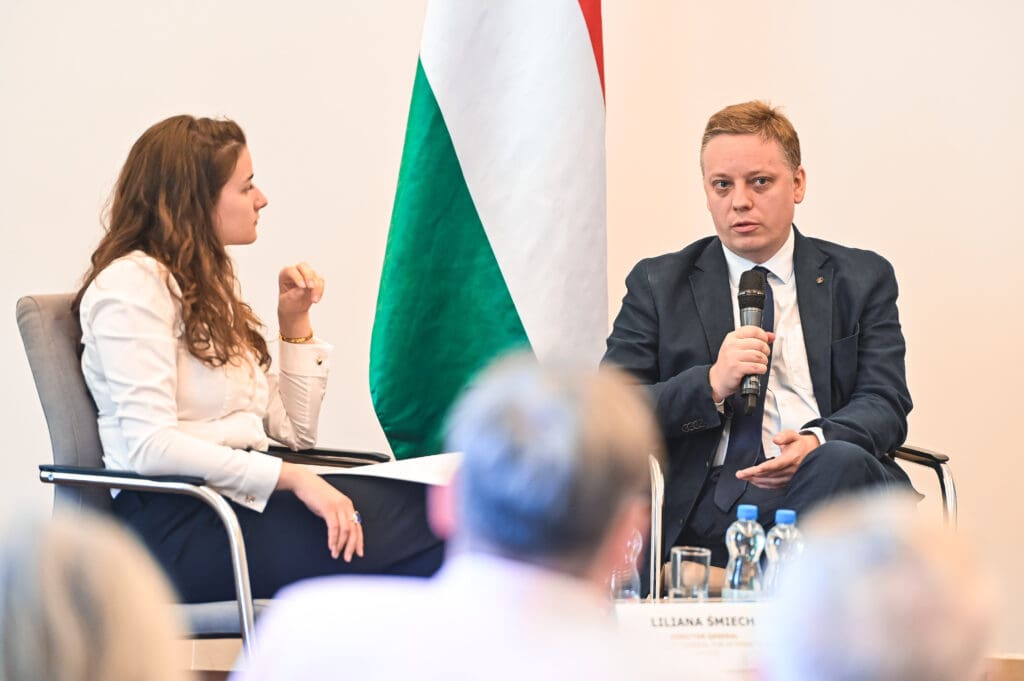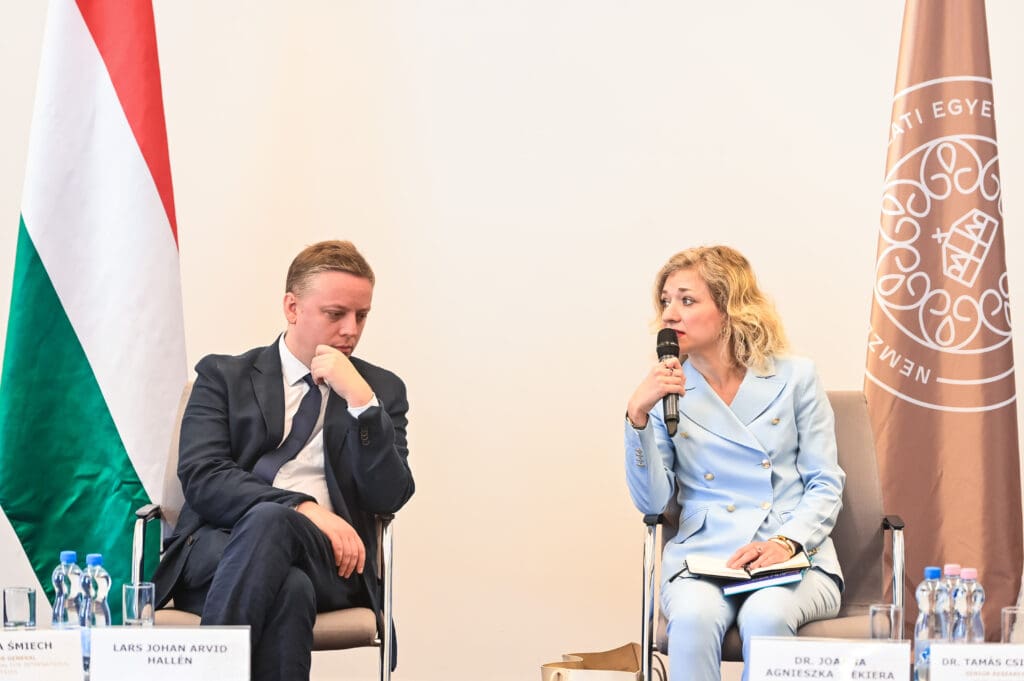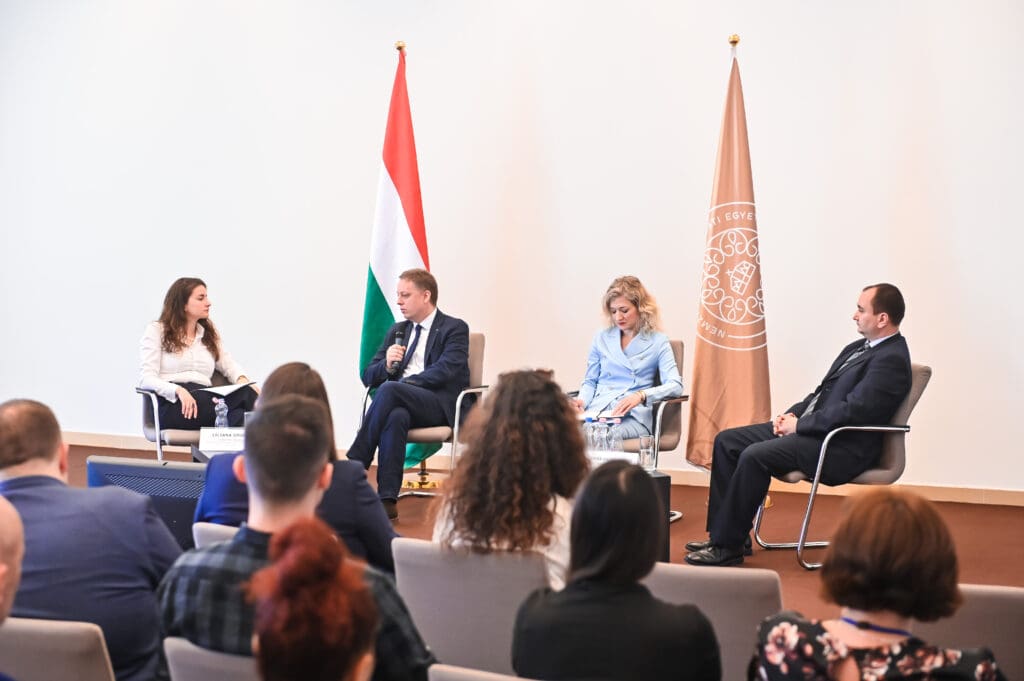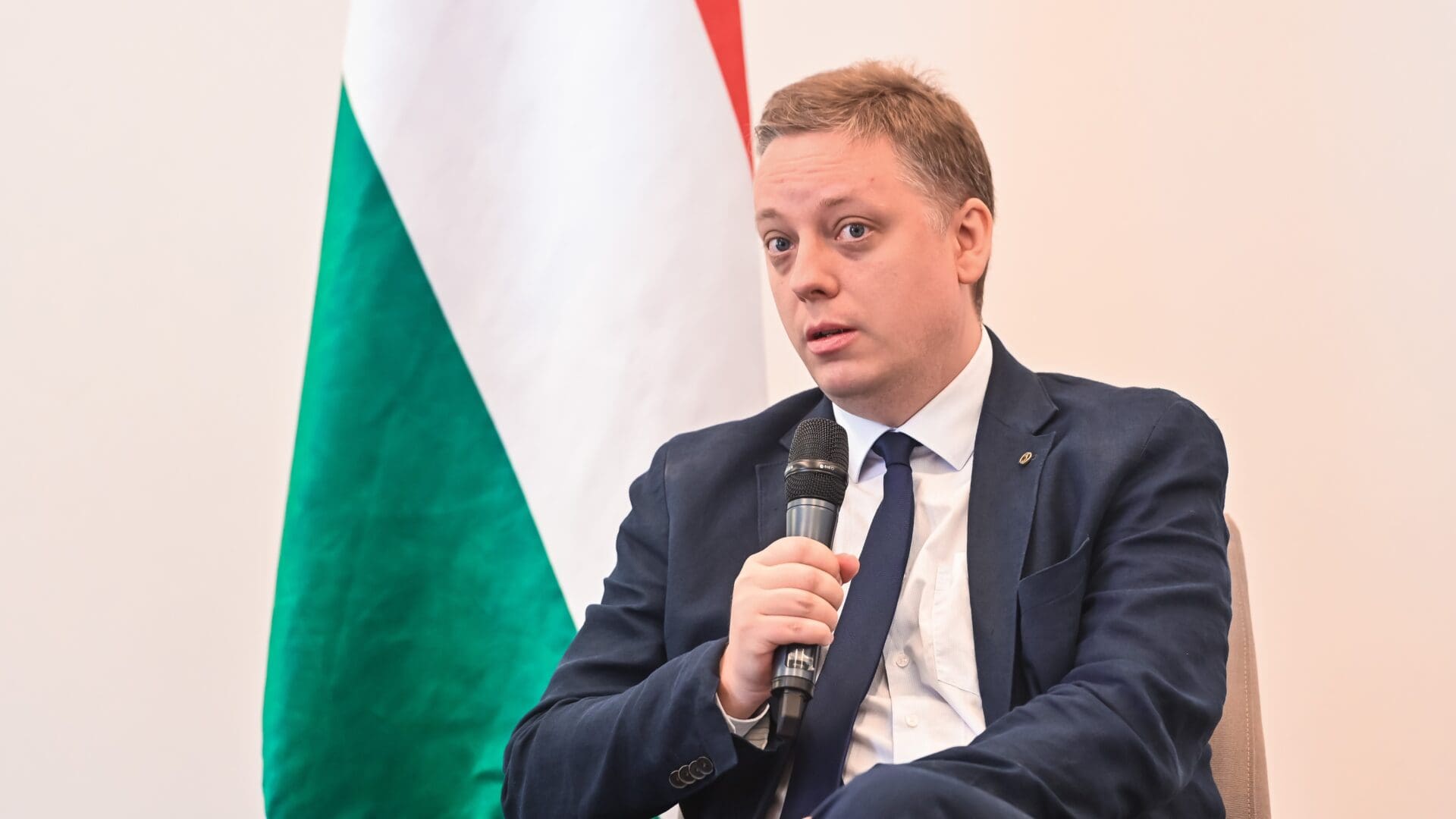Arvid Hallén is the Program Director and co-founder of Oikos, Sweden’s only Conservative think tank. A specialist in energy policy, he is especially interested in the nexus of energy, geopolitics and finance, and the shaping of energy systems by ideological views. He previously worked as an editorial writer, a political commentator, an asset manager for foundations, and has been the chairman of the Conservative Swedish student organization Heimdal.
During an event titled Into the Breach: Europe’s Call to Arms hosted by the Ludovika University of Public Service at their Budapest campus on Wednesday, 10 April, Hungarian Conservative had a chance to talk to him about Swedish Conservatism, energy, and security in the region.
***
You founded the first conservative think tank of Sweden, Oikos. What inspired you, other than seeing that there weren’t any before you?
We’ve looked in the archives, and I at least haven’t found any mentions of any previous Swedish conservative think tanks. Swedish conservatism was a vital and relevant political force during the early part of the 20th century. And during the middle part of the 20th century, then from say, the early 60s, mid 60s, late 60s, it became evermore marginalized. And I would say that by the mid-1980s, Swedish conservatism was kind of dead. I mean, there were some remnants here and there where it survived, like the Gallic village in Asterix and Obelix. All of France is occupied by the Romans. One village is still resisting.

Then what happened was that due to the Swedish immigration policies, a new political party, the Sweden Democrats, entered parliament. And they started calling themselves a Social Conservative Political Party. And the fact that we had a political party in parliament, which called itself Conservative, this kind of recreated interest in the term Conservatism not just as a historical term, but as what would current Swedish Conservatism look like. And then, when we founded the think tank, one of the founders is a Member of Parliament for the Sweden Democrats. And that’s why the think tank is independent of the party. We’re not part of their organization, we do our own things, and so on, and there is an obvious indirect connection, the fact that he’s still a member of parliament. And what we wanted to do was to both kind of discover and shape what this new Swedish Conservatism would be about. And it sounds a bit like a cliché, right? But it’s a voyage of discovery. We try to figure out what Swedish Conservatism is. Not 1924. But 2024? And how can we shape it in our direction?
Where did you look for answers in finding out what 2024 Swedish conservatism is?
We meet with international colleagues and friends from different countries. And we talk to them. And we try to see what kind of common strands there are in some kind of fabric of European Conservatism. But conservatism, more than liberalism or socialism, will always be in a way national, because it is shaped by the national experiences of people, their country, their history, and their traditions. So I think ideas of conservatism will always differ more than, for example the Hungarian Liberal Party will always be a lot like the Polish Liberal Party.
And when I look at what characterizes Swedish conservatism, it also means that today we have to talk to ordinary people who consider themselves conservative. We look at polling, we tried to figure out if we would try to introduce ideas, which are absolutely the opposite of what normal conservative voters think, and then they would say that this isn’t what conservatism today is about.
To give you some examples: Some of the things which clearly are front and centre of Swedish conservatism is being pro defence, anti-immigration, pro free trade. And if we compare ourselves with our friends and colleagues in southern Europe or in Catholic Europe, for example, there are some issues which are far more relevant for Swedish conservatives than for example, in Poland. For example, the abortion issue is not top of the agenda in Sweden for Swedish conservatives, LGBT issues are also quite far down, even though there’s been a new debate now on trans issues, on which conservatives are quite critical. But these kinds of issues which are associated with sexuality, or abortion are much less relevant to Swedish conservatism than it is to our friends in in Poland or Italy, or Hungary. And I don’t think this is a problem, because this is in the nature of conservatism, it will be different, there will be common strands, but there will always be a specific national tradition. And that’s not a problem. That’s not a bug, that’s a feature of conservatism.
Do you think the Swedish NATO accession should have happened sooner?
It absolutely should have happened sooner. I think it would have been hard for Sweden to join NATO before the end of the Soviet Union. Because if we had done that, it would probably have put Finland in a very, very tough position, the Russians would probably have forced them into closer cooperation. And then we could have had the most terrible situation where Sweden and Finland found themselves in different parts of an alliance, and in the worst case scenario would have to fight each other. That would have been terrible. It would have been like, I’m not sure if it works in the Hungarian context. Like Hungary and Austria being put in different parts of an alliance having to fight. Sweden and Finland were the same country for 700 years. And there’s still a big Swedish minority in Finland, some of them monolingual. So the accession could have been absolutely out of the question. But the fact that we waited until 2022, rather than joining around 1996, meant that we had to have this this problematic accession process with Türkiye and with Hungary, and it was kind of under the gun with Russia attacking Ukraine. Had we done this in a more responsible and controlled way previously, it would have been much better.

The reason this didn’t happen is where one can blame both the Swedish right and the Swedish left. One can blame the Swedish left, because they were absolutely obsessed with this idea of neutrality. They saw it not as a tool of securing Swedish national security, but for them, this was part of a complex of ideas from the 60s, for example, very extensive foreign aid, large scale immigration from the third world, neutrality between the West and the East. All these things were part of the idea where the left wanted to turn Sweden into some kind of humanitarian superpower. The idea that somehow we become morally superior to other people if we refuse to take a stand between democracy and communism. And if this sounds absurd, it’s only because it is.
And you can blame the right to the centre right at the same time. The Liberal Conservatives. Because they didn’t push this issue forcefully. Their view was always that we will join NATO only when the Social Democrats. Then the war changed their mind. And in a way, I understand that you want to take big security policies, you want to do it in kind of a consensus environment. But on the other hand, the right didn’t push to create an opinion to join NATO. It was extremely weak. We had a right wing government between 2006 and 2014. And I don’t think they said the word NATO a single time. And for me, I have been wanting Sweden to join NATO for 25 years or so. I was always a tiny minority. Popular sentiment to join NATO was always weak 10 or 20 per cent of the population who supported this, and we were seen as right wing cooks, in a way. Almost like we had said we should develop nuclear weapons or something. Not really. But it was seen as a strange and radical view and also irrelevant, because ‘it was the age of eternal peace, who cares about NATO and about conventional military forces, we don’t need that that’s old fashioned as Cold War stuff.’
When Russia invaded Ukraine on a large scale in 2022 the Swedish popular opinion changed overnight to over 70 per cent in support in maybe two months. I guess you can call this pragmatic, I guess you can call it opportunistic. I guess you can call it people waking up. You can pick whatever one you feel like, it’s probably a mix of them.
What also happened then, around the fall of 2021, the Social Democratic defence minister, he had a speech at their party conference where he said, I can’t quote directly, but something along the lines of ‘we will never join NATO, over my dead body. As long as I’m in defence, this is never going to happen. Absolutely not.’ And to be fair to him, he said this because what he wanted to deepen bilateral defence cooperation with the US.

And then his left-wing critics said, are you trying to get us into NATO by stealth? And he said no, absolutely not. And then a few months later, the worst [the war] starts. And even after the worst started, our prime minister at the time said that we will absolutely not join NATO, since doing so would destabilize the Baltic area. It will increase tensions, essentially, and this is the Russian propaganda line.
And then after a while, somebody probably told her, you know, Finland seems to be joining, and they were like, ‘Okay, we have to change our mind.’ She changed her mind under the gun. And there was also another issue, I think it’s very important, that the leader of the opposition had an excuse to join the current prime minister, saying ‘we are going to push this issue, we’re going to abandon our previous line that Sweden can only join NATO if the Social Democrats support it; there’s going to be an election this fall and fall of 2022. And we’re going to have this as an election issue. We’re going to campaign on Swedish NATO membership.’ And then they started pushing for it, and they did it quite well. And then we had a change of government, and then we had a long process. And now we’re in NATO.
You are an energy expert. Hungary has a large amount of renewable energy available, but is criticized for upgrading the existing nuclear power plant. Do you think nuclear power can replace renewables in some way?
Last summer I got the opportunity to visit the Paks nuclear power station, and it’s a very impressive facility with four small, very well designed reactors. Russian design, and most components were made by the Czechs. Very well run facility according to what I saw. And of course, there’s a plan of building the new two much bigger reactors.
Regarding renewables, as far as I understand the potential for wind power in Hungary is quite limited, the winds are weak, so it wouldn’t really make sense [to rely on it]. In Sweden, there is a giant potential for this. But of course, in the southern half of the country, where most people in Sweden live, it has become very hard to build more onshore wind power, because people don’t want to have these things, these giant towers that might be 200 metres tall, and offshore of maybe 300 metres. They think they are a nuisance, they lower property values, and they ruin the natural landscape. And of course, these things are true. So does building a highway or a railroad line; there is always a trade-off. And in a way the environmental movement has always talked about renewables as some kind of a thing which is only good for the environment. But there’s always a trade-off. If you start a mine somewhere mining copper, there will be a local environmental effect. There is always a trade-off, and you have to ask yourself, is it worth it? And this depends on different things.
Consider a very densely populated country like Hungary. Of course it would be more problematic to build giant solar farms than it is to build them in Arizona, or in West Texas. So I don’t think there is a clear cut answer here. But I think what one must consider, no matter if one is going to build a nuclear power station or a solar farm or wind power station, the local people who live close to the facility or the proposed facility, they have to have a word, you have to be able to give them essentially a veto. In Sweden, there is a veto not for the local people, but there is for the local authority. They have a veto against, funnily enough, for two things: for wind power and for uranium mines. Not for any other mines, just uranium mines. And not for solar farms either—only wind farms; not even for nuclear power stations. But I think the way to succeed with some kind of green transition is that you should never do it against the will of the local population. If they say ‘no, we don’t want this thing here’, then you say fine. We build somewhere else. Or if we can’t find a space to build a solar farm, we’ll have to be more adventurous instead. You can always find places to build reactors because they use absolutely no space at all.
Read more from the event:








